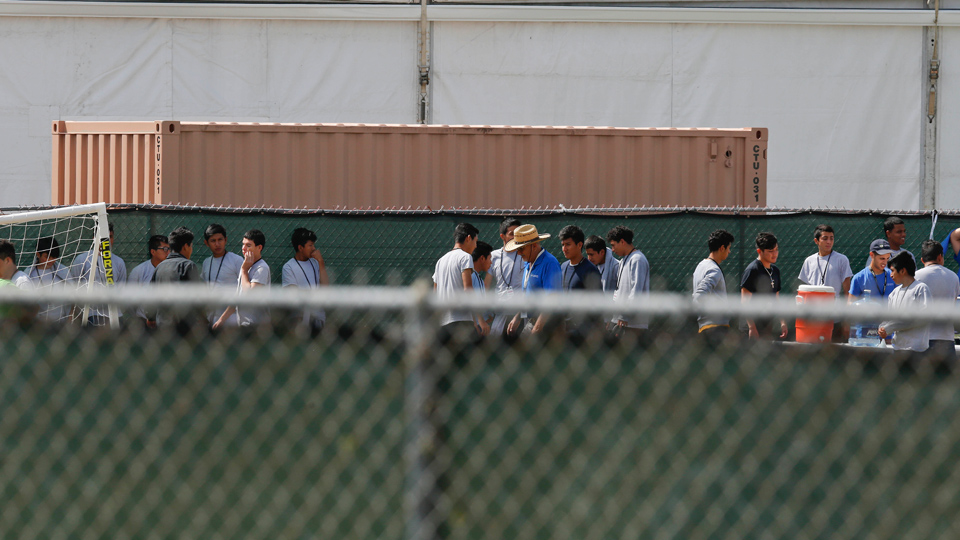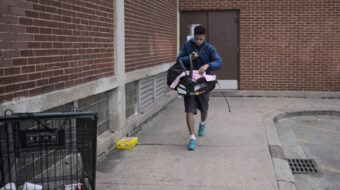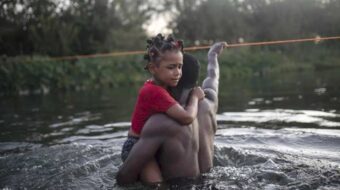
MCALLEN, Texas (PAI)—There’s a big hole in President Donald Trump’s reversal of his “zero-tolerance” policy of splitting up parents from kids at the U.S.-Mexico border: If two kids show up, without a parent with them or without a legal guardian who can prove it, they’re split up—and they stay split up.
And that’s what happened before Trump, too.
Efran Olivares, director of the Texas Civil Rights Project, disclosed that scenario still continues while discussing the case of one 24-year-old Guatemalan father, Mario Perez Domingo, whose 2-year-10-month-old daughter was yanked away from him after both crossed on July 9 between border checkpoints in Texas. They’ve been split ever since.
That was the day before the Customs and Border Patrol was supposed to reunite all children aged five and under with their parents, under Trump’s new executive order, buttressed by a federal judge’s injunction. On June 20, Trump reversed course on splitting parents from their kids at the border—regardless of whether the parents sought asylum or not. His policy led to a continuing national and international uproar.
But while the new policy, and the judge’s ruling, is supposed to get the Customs and Border Patrol to reunite parents with kids, it hasn’t done so in the Domingos’ case, Olivares told a July 13 telephone press conference. And it doesn’t do so if two kids show up at the border with no father, mother, uncle, or other guardian there to claim them, and to prove the relationship and the guardianship.
Then the kids get split from each other and turned over to the U.S. Department of Health and Human Services’ Office of Refugee Resettlement, to be placed in shelters around the country.
There are “two to six” such cases daily of unaccompanied and unclaimed sets of kids at the McAllen, Texas, station alone, Olivares said. He doesn’t know the conditions at other border checkpoints, as the Texas Civil Rights Project and its volunteer attorneys have been tied up, full-time, helping migrants at McAllen, one of the border’s busiest checkpoints.
“Because we monitor McAllen, we were able to catch these cases,” Olivares explained. Separation of siblings is the most frequent.
“When it’s not a” case of “a minor traveling with a legal guardian,” but, say, a brother and sister or two cousins, “the government separates them. And if one brother is a minor” while the other is an adult—who could be seeking asylum—“they get separated.”
The question of unaccompanied minors being detained, or turned back, at the border, first
arose during the Obama administration. It later declined until a recent upturn in numbers. Then, as now, the unaccompanied kids often, like the adults, are fleeing chaos, wars, and dangerous gangs—which often threaten to conscript the kids—in Central America.
Once the unaccompanied kids are taken at the border, and then split up, “the government will put the burden on the grandfather,” for example, “to prove” legal guardianship, Olivares said.
Meanwhile, the kids, now split from each other, are sent to the Office of Refugee Resettlement. ORR data for fiscal 2017, which ended Sept. 30 and is the last full year available, showed 40,810 such kids were picked up. They spent an average of 41 days—or so ORR said—in “shelter and transitional foster care only.”
“It’s an emergency for underage siblings, who may not have another person in their lives,” says Olivares. “And for the younger kids, it can be really traumatic.”
ORR said it placed 42,497 unaccompanied kids with “acceptable sponsors” that fiscal year, and 23,543 more since Oct. 1. The acceptable sponsors, ORR claims, must pass background checks, ensure the unaccompanied kids show up for scheduled hearings, and turn them over to the Immigration and Customs Enforcement Service “for removal from the United States if an immigration judge issues a removal order or voluntary departure order.”
Like free stuff? So do we. Here at People’s World, we believe strongly in the mission of keeping the labor and democratic movements informed so they are prepared for the struggle. But we need your help. While our content is free for readers (something we are proud of) it takes money — a lot of it — to produce and cover the stories you see in our pages. Only you, our readers and supporters, can keep us going. Only you can make sure we keep the news that matters free of paywalls and advertisements. If you enjoy reading People’s World and the stories we bring you, support our work by becoming a $5 monthly sustainer today.












Comments